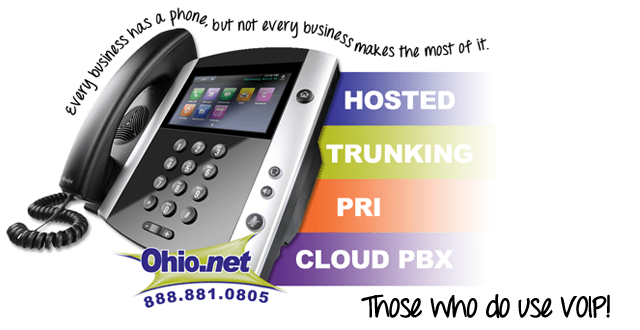Updated on September 19, 2022 by John Clarke

Table of Contents
ToggleWhat do we mean by making ‘the most’ of your business phone?
You’re right. That was a pretty vague statement we made. Let’s clarify. When your business switches to VOIP, you can expect to:
1. Make the most of your MONEY.
2. Make the most of your TIME.
3. Make the most of your RESOURCES.
4. Make the most of your CALLS/LEADS.
5. Make the most of the LATEST TECHNOLOGY.
Let us tell you how, but first…
What is VOIP?
VOIP stands for “Voice Over Internet Protocol” and is also called simply “Voice Phone.” It’s a phone system which, instead of running through a traditional land line, runs through the internet. Without burdening you with loads of jargon and details, this means your standard telephone audio is converted into a digital format, travels over the internet, and then converts back into standard telephone audio. All of which occurs very quickly, of course.
You’ve got questions:
Why would I want my phone to run through the internet?
What are the advantages of VOIP, anyways?
Why do I need VOIP for my business when my current phone works just fine?
Well, that’s what this article is about. If you’d like to know the answers, keep reading!
1. Money
We’ll get this one out of the way first. Because we all know it doesn’t matter how many special features and doo-dads a new technology has, if it’s not cost effective for your business, it’s just not going to happen.
VOIP can be cheaper than traditional phone systems in more than one way:
-VOIP uses your internet connection instead of multiple phone lines, reducing costs and the number of bills.
-VOIP offers toll-free calling and can eliminate long distance fees for you and your customers through Multiple Location Support. (More on that feature later.)
-Advanced VOIP options get rid of your onsite PBX, meaning no service fees or software updates.
Some VOIP services allow your business to continue using its current technology, meaning you save money up front, while more advanced options require the purchase of special phones. However, you may decide the ROI gained through the extra capabilities of advanced VOIP phones make them well worth the initial cost.
2. Time
The phone line is down, and you aren’t getting any calls. Not good.
Sure, this doesn’t happen all the time, but when it does it can really put a damper on business. With VOIP, you can have built-in disaster recovery. This means that whatever is going on— be it fire, wind, or high water—your customers will be able to reach both your auto attendant and voicemails. There are also many options for receiving calls until the situation is remedied, such as forwarding calls to cell phones.
VOIP reduces downtime in other ways, too. With your phone system online, many issues can be addressed remotely, meaning fewer on-site service calls.
3. Resources
What’s your most important resource? Your employees, of course!
VOIP helps you make the most of your (wo)manpower by increasing efficiency and effectiveness.
Is your sales/service team often on the road? Use Find Me/Follow Me to decide when calls should go to a desk and when they should go to a cell. Find Me/Follow Me is an advanced form of call forwarding which is personalized to suit your needs. You can even specify calls to go to a different voicemail or phone after hours.
4. Calls/Leads
Your marketing team works hard to get your name out there. Whether if it’s print ads, a television spot, online search, or social media, the desired action is always the same: a phone call!
So what happens when a potential customer calls, but doesn’t get through? If you’re lucky, they try again, but too often they will simply move on one of your competitors. Call Forwarding, which we discussed earlier, helps remedy this, and so does Call Queuing.
Sometimes you have more calls than you can take. Instead of losing calls or sending excess callers to voicemail, Call Queuing allows for customers to be put on hold until someone is available.
5. Latest Technology
Maybe you know someone one (or are someone) who refuses to ditch their flip-phone for a smartphone. “I just need it to make calls! I don’t need all that fancy stuff.”
Many businesses, especially smaller ones, are prone to adapting this attitude towards VOIP. After all, “If it’s not broke, don’t fix it.” Right?
The thing is, while many smartphone features are superfluous or “gimmicky”, the features available with VOIP phone systems are actually incredibly useful and sometimes even essential for certain industries.
These features include-but-are-not-limited-to:
Multiple Location Support – For businesses with more than one location, especially if those locations are in different states. Allows you to have a friendly-looking “local” number and, as we discussed before, no long-distance fees.
Remote Office –Working from home, on vacation, or on a business trip? VOIP phones work anywhere with a high-speed internet connection! Just take your desk’s phone with you and you won’t miss any calls.
Call Recording – Whether you’re meeting regulations or training your customer service team, the ability to monitor calls offers endless insights which can be used directly to make your business better.
Conclusion
Your phone could be doing so much more for your business. It’s an essential tool you use every day, so why not make it as effective as possible? In a world where businesses have to be smart stay ahead, VOIP is a no-brainer.
Thanks for taking the time to read! If you’re ready to start making the most of your business phone or are interested in learning more about the different types of VOIP and what they can do for your business, we’re here to talk. Call 888.881.0805 or Contact Us for a free, no-commitment consultation. You can also learn more at www.Ohio.net.


